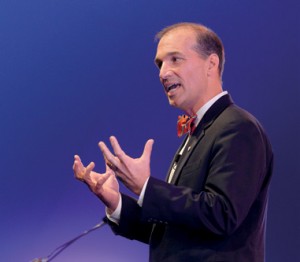by Todd B. Bland
 The range of Milton’s alumni accomplishments — personal and professional — is remarkable. You are diverse, impressive, courageous individuals. As a collection of stories chronicling your lives, Milton Magazine is a great resource. It shows us, in real time, how alumni are leveraging their education, their passion, and their skill to develop creative and meaningful lives.
The range of Milton’s alumni accomplishments — personal and professional — is remarkable. You are diverse, impressive, courageous individuals. As a collection of stories chronicling your lives, Milton Magazine is a great resource. It shows us, in real time, how alumni are leveraging their education, their passion, and their skill to develop creative and meaningful lives.
Hearing your stories is a favorite part of my job. It helps me see the value of Milton’s educational values and traditions, writ large in today’s world. It helps guide me, as all of us here at School consider how a modern school should — must, in fact — evolve. We’re responsible for providing today’s students with an education relevant in their world. How will we definitively prepare them to undertake, or to create, professional roles we can’t now predict? Today, the iconic elements of the Milton experience that you remember — a peerless writing program (remember mega-blunders?), learning Latin, Class IV Talks, Olympic-level speech and debate, and “DYO” science experiments — are coupled with courses focused on neuropsychology, programming artificial intelligence, narrative journalism and behavioral economics. We’ve implemented a new faculty role — the technology integrationist: two experienced teachers who love technology are seeding a culture at Milton that helps faculty and students integrate technology that will scale up the teaching and learning process. We’re committed to renewing our curriculum. It’s a strategic priority, and we’re holding ourselves accountable for a responsible cycle of evaluation, looking to identify the right balance between tradition and innovation.
On November 30, global thought leader, educator and futurist Charles Fadel spent the day with faculty. (Mr. Fadel co-founded the Center for Curriculum Redesign and has written two celebrated books on educational relevance.) He was direct and concrete about the ways that educating young people have changed in only five years and how categorically different education will be in another, five, ten, fifteen years. Imagining explicitly how the world will change is difficult, but analyzing demographic, environmental and employment trends is critical as we work to prepare children appropriately. Mr. Fadel’s work has been in international educational reform. He is a particularly powerful resource for Milton as we assess our program and requirements. He focuses on developing critical competencies, which you would recognize. They’re present in our mission, and as strategic priorities. We have described them in detail, and we’re committed to cultivating them in students. Thinking from this centering point helps us consider how to organize and integrate our academic departments. We have confidently undertaken key conversations about modern competencies like self-awareness, resilience and empathy, and about ways to incent creativity and innovation. Leveraging our traditional strengths, along with effective innovation, will enable us to develop in students a broad set of skills that will be critical, regardless of the paths that our graduates choose. As you know, challenging work forces you out of your comfort zone. That’s where we are, and that is a good place.
Making important changes can be daunting. In recent history for instance, Milton shifted away from a commitment to Advanced Placement (AP) courses. Each year, many of our students do well on AP exams, but directing our own advanced course content — rather than following that described in AP syllabuses — gave us the freedom to cultivate advanced learning in the Milton tradition — aiming at depth, rather than just breadth. Milton made that decision to provide the best academic program for our students, independent of parameters that — in our view — narrowed the learning experience. The fear then was that our college outcomes would suffer. Milton students continue, year in and year out, to matriculate at the most competitive colleges and universities throughout the country and around the world.
Milton has, and will, prepare young people for their lives in and beyond their college years. Your stories, and the stories you read in Milton Magazine, are our measures of success. We owe Milton alumni, faculty and staff, students and parents nothing less than pursuing the mission that has shaped Milton for centuries, and which will now serve them in the 21st century.



